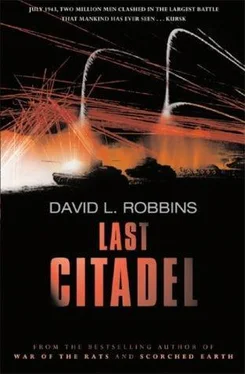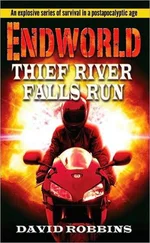With the black buttons heaped in his large palm, he poured them into Dimitri’s accepting hands.
‘Here, Papa.’
July 10
0640 hours
beside the Vorskla River
kilometers southwest of the village of Vorskla
The big one called Ivan woke him with a boot. Old man Filip brought him a canteen for a swallow, and that was all. He was untied from the barn post where he dozed the short night sitting up, drooling on his Merit Cross with swords. He was helped off the ground onto vague legs and tossed a wool jacket and a cap. He stripped off his SS coat and left it on the Russian ground bearing his lone medal. Abram Breit was put on a horse.
Now Breit wiped sweat from his brow with a freed hand. He held out his arm to examine the rope burn on his wrist.
Such heat, he thought, so early in the morning. What kind of people are made by this sort of land? The steppe was featureless, the little river dallied through it, only a bland green seam across a limitless fabric of yellows and greens, a bleak sky that seemed not lofty at all but oddly, oppressively low, heavy like water. The land makes the people. Are they harsh, too? Are they as dull as this? Certainly, they were as vast, from what Breit knew of the way the Russians fought and perished in their astonishing numbers. He studied the five partisans riding on all sides of him. They fit here. The land and they bore each other in their countenances, determined, endless, and yes, dull. Germans do not belong here, he realized. This is Asia. We are socialized. We were not left to grow so wild by such immense stretches without people. These Russians. These peasants, burdened and ignorant. They will be set loose on Germany if they win the war, on Europe. Breit considered what he had done so far to help bring Hitler down, what he needed to continue doing, and was fearful for what might arise from his brave deeds and good intentions.
They rode in the open. The land was so flat that no German patrol could come within kilometers of them without being seen. The six were just a handful of Russians going between towns after daybreak, nothing suspicious about that in a landscape of farmers. Breit was no horseman. His mount’s head bobbed walking along the river, balking and wanting to turn always out of the group, down to the water.
Filip rode alongside.
‘Tighten your reins, Colonel. The horse will go more smoothly.’
Breit took in slack from the leather straps. His horse nickered and shook his mane, objecting.
Breit was given his hands and feet. The ropes were looped and stored in the big one’s knapsack. His name was Ivan, a funny name for a Russian, it was the nickname the Germans used for all Russians, they were ‘the Ivans.’ A skinny one with slits for eyes was Daniel, who carried knives and guns bulging on him like pine cones. The woman was Katya. She was a pretty girl, almond-eyed and lean. The old man Filip called her ‘ Hexe ,’ a witch, and did not explain why. Riding behind her, Breit made up his own reasons. She was a witch because she seemed as mean as anything out of a fairy tale. She rode her horse like a broom. She did not hate, though. Not like the old hard one named Josef. That one was a crow. He was black, silent, surely an evil portent when he appeared on any doorstep.
‘Filip,’ Breit whispered to the elder riding close to him. If he had any hope of getting away from these partisans – a slim hope, a dangerous thing even to consider – if he was even to survive the day, it would be this German-speaking old man who must help him. ‘May I have some water?’
The old one lifted the canteen from around his saddle horn. Breit took it and swallowed as much as he could. He did not know when he would be allowed to drink again. He was proven right when the big one barked something and Filip reached up for the canteen, splashing water over Breit’s chin in mid-gulp.
Breit did not know if the witch girl had done as he’d begged and not told anyone he’d said he was a spy. The leader of this partisan cell did not return to the barn and ask more questions; Breit figured he would have if the girl had mentioned anything to him. She’d probably tell the Reds when she handed him over, if he was alive for that. The Reds would interrogate him. The inquisitors wouldn’t have to lift a finger, he’d spill everything he knew about the German dispositions in the field. His wellspring of facts and figures could help the Soviets, of course, and might still tilt the battle their way if they acted fast enough on what he told them. But if he managed somehow to slip these partisans and reach Berlin, his information would come through Lucy. The Soviets would jump on Lucy intelligence within the hour of receiving it instead of reading a report several days from now penned by some obscure commissar. He needed to speak to the Soviets from Berlin.
The Hexe had made it clear, he was not going to be released, it was an absurd thing to ask. He knew it when he asked, but what else could he do? Filip whispered to him this morning not to try anything, they would hurt him for it, perhaps kill him. Breit knew, if the witch turned him over to the Red Army, that would likely be the end of him. At worst, he’d be shot after his interrogation, tossed into an unmarked grave in empty Russia. At best, the long miseries of Siberia.
He had no plan to escape. If he bolted, he’d be ridden down and brought back, or shot. There were no German patrols out this morning, every available soldier was either at the front or walking the train tracks to protect them from these same partisans. No, there would be no rescue. All of them except Filip – and this included the witch – looked like they’d just as soon slit his throat as have him along. The black partisan Josef seemed to be restraining himself from doing that anyway. How could he escape? He could not calculate his chances, he lacked enough facts. He supposed his odds were poor. Where were they right now, what river was that? Where were they going? He knew only that he was surrounded and abhorred. He could not out-fight or outride them. He was certainly no braver than them, these men and a girl who lived in shadows under the noses of an entire German army. He would have to out-think them. They were Russians, he could do it. But when would there be an opportunity for that, when being smarter might overcome being faster, harder, nastier?
Swaying in his saddle, his rear and crotch chafed. He was perspiring under the wool jacket and hat. He conjured images of his death, from a hole in the head, or freezing in Siberia, torture in Moscow. He missed his old life, the safe one spent in classrooms, in quiet galleries and Jew basements, even two days ago beside a map table, a spy. He invented artistic ways how Picasso might treat each of his deaths. A comical birdhouse inside the hole in his head. Five bodies attached to one strange head to depict his wintry shivering. Torture, Picasso would have a Cubist’s field day with that, suns and stars bursting inside a body broken into geometric bits.
Am I brave enough, Breit wondered inside the morbid gallery of his imagination, to make a break for it? I have a very valuable skin to save. I have a cause, a war to alter. I am historic. Will I try? Or will I shuffle out of the history books off to Siberia, quiet again, quiet forever? I don’t know. When I became a spy, I didn’t prepare myself for dying, not the way a soldier does. I am so scared.
Breit decided to gather more facts, to watch for the elements of his day, the basics of his fate. Then he would see if he owned the courage to act.
He tried to prod his horse closer to Filip’s. With a few soft kicks, the animal broke into a little trot, then slowed and stumbled sideways.
Читать дальше












